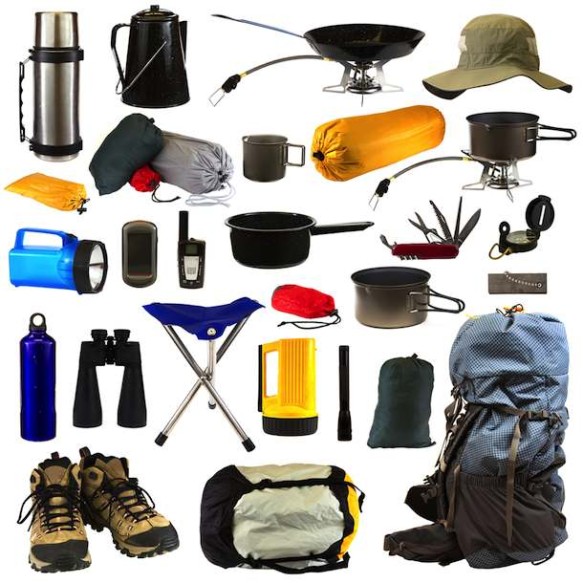How to be Unprepared for Almost Any Situation
The world and its many retailers want us to believe we should be prepared for any “what if” situation: What if I have a four course dinner party for 15? What if my parents and in-laws stay over at the same time? What if I am invited to the save-the-seagull gala next month?
In order to be prepared for all of these situations, we must keep arsenals of stuff at the ready–stuff that costs money to buy and store; stuff that will eventually occupy landfills; stuff that clutters our homes and minds.
But what happens on the rare occasion we find ourselves unprepared? Not much, right? We borrow. We hack an alternative solution. We do without. The threats of being unprepared are more social (i.e. fear of being judged) than mortal. The fact is humans as a species are very adaptable and most of our friends don’t care if they have to drink wine from a water glass should we run out of stemware.
Here are a few common places where we tend to unnecessarily err on the side of preparedness and some easy alternative solutions:
Problem: Formal wear. Many of us keep that tuxedo or gown around for that formal occasion that never comes. Or if it comes, it doesn’t justify the real estate necessary to store special garments the rest of the year. Unless you’re a politician or celebrity who attends galas on a regular basis, the chances that you need a tux or gown year-round are low.
Solution: Have two simple and versatile suits or dresses (summer and winter weights) that work for formal occasions. The darker and less flashy, the better. For men, make one of the suits black and invest in a matching tie. Women, accent your plain dress with a necklace. If you really need to dress up, rent a tux or dress.
Problem: Guest rooms. Unless you have stay-over guests more than 10-20% of the year or you use a room for multiple purposes, most guest rooms have a hard time justifying their existences. Between the expense of buying or renting, the energy needed to heat and cool, and the time and energy spent cleaning, having an extra room solely for guests seldom makes sense.
Solution: Have your guests crash in the living room on an inflatable bed or sleeper sofa. Sure, it can be inconvenient and lack privacy, but it’s far less inconvenient than paying thousands of dollars for a room that’s rarely used.
Offer to split Airbnb expenses for your guests. Do the math: A rented room at ~$50-100/night will be a lot cheaper than the associated expenses of having an under-utilized spare room throughout the year.
Lastly, if you’re stuck with a guest room and have no present need for it, consider sealing it off to eliminate energy needs, or renting it out, either with Airbnb or to a longterm tenant.
Problem: Tableware. Somehow the idea has been planted in the collective consciousness that every home should be set up for multi-course dinners for 12-15 people. You’re ungracious if everyone doesn’t have a dedicated glass for water, white and red wines, or enough forks and plates for salads, mains and desserts. Baloney, we say.
Solution: Improvise. Clean plates and silverware between courses. Have a multipurpose glass that works for any beverage. Use a soup spoon to stir your coffee. Serve dessert in a cup. Keep paper plates around for the rare occasion of overcrowding (we do all of these things for dinner parties at the LifeEdited apartment).
Problem: Cooking supplies. Maybe there’s that cake recipe that requires a sifter or a soup recipe that requires a food processor. You want to cook these things, but lack the tools.
Solution: Improvise, borrow or don’t make that dish. Buy pre-sifted flour. Use a blender instead of the food processor. Borrow baking sheets from your neighbor. Choose another dish that works with the kitchen tools you have.
If you are a gourmand who frequently makes elaborate dishes, by all means have the kitchen tools you need. But buying a costly and space-hogging tool for a dish you rarely prepare makes no sense. There are many dishes out there that require only the most basic cooking tools.
Problem: Camping gear and other bulky sports equipment. Many of us think we are still 19 years old–an age when we could jump ship for a two week backpacking trip on a moment’s notice. We keep our tents, sleeping bags and other gear in storage year-round, thinking we’ll use it more than the one or two times a year (or, truthfully, decade) we actually do.
Solution: Rent or borrow. Many big outdoor equipment stores such as REI and EMS rent a wide range of outdoor gear. Also, if it’s a short trip, renting a motel room or cabin in the woods often makes more sense than creating a gear-intensive base-camp.
Where are you frequently unprepared? And how do you handle it? Let us know in our comments section.
Camping gear image via Shutterstock





